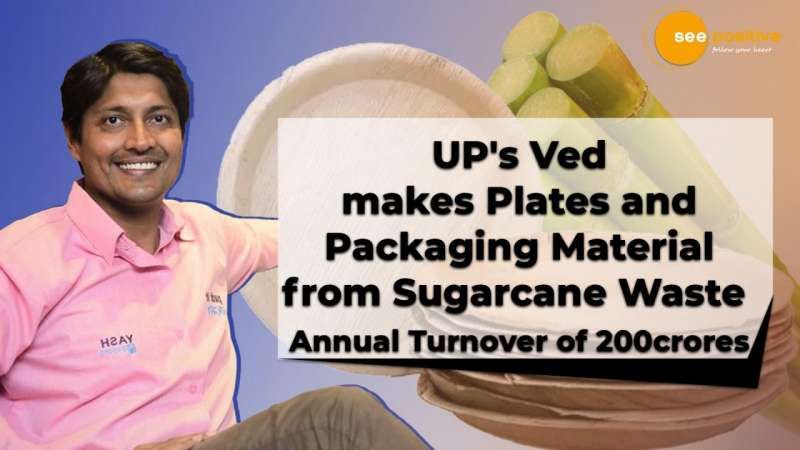

Ved News Highlights :
- Ved Krishna, an Ayodhya local, has taken the initiative to recycle sugarcane waste .
- His annual revenue is more than 200 crores as a result of this.
- Ved’s team is currently working on three different sorts of products , comprises packaging, food transport, and food service equipment.
Why is Ved in News?
Sugarcane is grown extensively in India, particularly in Uttar Pradesh, Maharashtra, and Karnataka.Every year, this results in a massive volume of sugarcane waste.Farmers face a difficult problem in managing it.Farmers sometimes burn it in the fields, which pollutes the environment.
Step towards this problem
Ved Krishna, an Ayodhya local, has taken the initiative in this direction.Sugarcane trash is used to make plates, bowls, cups, and packaging materials. Which they are promoting both in India and internationally.His clients include a number of large corporations. His annual revenue is more than 200 crores as a result of this.
About Ved Krishna
Ayodhya was the site of the early Veda Krishna studies. He went to Dehradun for his undergraduate studies and subsequently to London for his postgraduate studies.He then moved to India and began working for his father’s company.
‘Father used to prepare papers in a traditional fashion,’ Ved remarks .For several years after joining him, I attempted to comprehend his work.It is decided that something new should be done after some information has been obtained and experience has been gained.After that, I broadened my work’s scope.
Outside of Ayodhya and Uttar Pradesh, I began marketing my goods. Quality-driven.The group increased in size.We gained a lot of experience as a result of this, and our business grew as well.For nearly 10-12 years, it went on like this.
It’s around the year 2012, according to Ved. The use of plastic has been steadily expanding. Plastic was being used by large corporations.I was under the impression that we were creating paper from sugarcane trash.Why not turn it into a substance that can be used instead of plastic?Then I started looking into it.
Following that, I learned that packaging material can be made from sugarcane trash.
‘However, we were unaware of the process at the time,’ he says. Then I did some research, spoke with specialists, and got the essential information. Then, on a modest scale, I began preparing packaging material from sugarcane trash.
After that, we approached a few businesses and began developing products for them. This project received a positive response.
When demand expanded, the work began to require large machinery
“Demand for our products surged when we started manufacturing packaging materials,” Ved explains.Many businesses began requesting packing materials from us.We had fewer manpower back then, and the machines were likewise modest.As a result, we were unable to meet the demand for the product.
After that, we used our savings to purchase eight large machines and expand our crew.They were taught how to remove fibre from sugarcane trash and use it to produce packaging.Then, beginning in 2016, we began to supply packaging materials on a significant scale.Following that, we expanded the range of our goods.
How do they serve?What is a marketing model, exactly?
According to the Ved, the first step in making recycled items from sugarcane trash is to collect sugarcane waste.Our staff gathers garbage from farmers in the fields for this purpose.We then transport sugarcane trash to our factory by visiting sugar mills.After that, it is properly dried. The powder is then made. Water is added to prepare the pulp .Following that, kitchen and tableware items are manufactured in various shapes using pulp through the machine, all of which are fully eco-friendly.There are no chemicals in it.
Ved’s team is currently working on three different sorts of products.This comprises packaging, food transport, and food service equipment.Many large corporations, such Haldi Ram and McDonald’s, are preparing such products.Many small businesses have partnered with them, and they are preparing kitchen and tableware products for them.Every day, ten thousand tonnes of material are produced.Whose demand is both in India and overseas.
According to Ved, we are now working on a B2B model. Many large corporations have partnered with us. Customers can purchase our products straight from Amazon and Flipkart if they so desire.
Ved has employed hundreds of people as a result of his efforts.
According to the Veda, people’s understanding of this sector has grown, and many are also venturing into it as a business. We’re working on a franchise model of our own.We are providing space to those who are interested in this activity and are willing to invest monies through this channel.
Our team also provides training to persons who wish to learn how to produce items from sugarcane waste, because this activity cannot be done without proper training and knowledge of the process.
There are no limits when it comes to the budget. If someone wants to work on a large scale, they will have to spend 2-4 crore rupees.On the other hand, someone who wants to accomplish it on a modest scale can do it for less than ten lakhs.
Even if one does not have so much money, he can create the necessary items from sugarcane waste for as little as 1-2 lakh rupees, and others have done so.
The most important aspects of this are marketing and networking.That is, if there is a market for whatever product we create and it can easily reach people, then only good earnings will be available.


